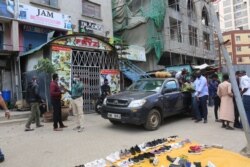Kenyan authorities last week locked down the Nairobi neighborhood of Eastleigh because of a jump in confirmed coronavirus infections. As a result of the restriction of movement in and out of the area, aimed at slowing the spread of the virus, businesses in Eastleigh are struggling to get by.
Mohamed Said, a food seller in the neighborhood, said business was poor, as few people were willing or able to shop at his store.
Slack time in the morning
"People are not coming to buy foodstuffs the way they used to before," he said. "There is less movement of people around 4 in the evening. That’s when you see a few people around. When I come to the shop early in the morning, you regret coming to the shop that early because there are no people.”
The lockdown is heightening frustration in the Somali-majority neighborhood in central Nairobi. Said’s neighbor, Hussein Osman, also a food seller, said he might soon go out of business.
“Since the lockdown began, our business has gone down, and the lockdown has brought us a lot of losses," he said. "We cannot afford to pay rent, and we are requesting the government to help whenever it can.”
Kenyan authorities closed off the area until May 20 after 29 new cases of the coronavirus were found there in a single day. Authorities are allowing only essential service providers, like medics and those delivering food, to enter and leave the area.
Mohamed Mohamud said the restriction had made life difficult.
“People here are businesspeople," he said. "Some used to receive money from their relatives in Western countries, but now there is nothing. Coronavirus has crippled our people in the West, and the income we were getting from here — it's closed. There is no help. There is no hope.”
'We will succeed together'
On Wednesday, Kenya’s interior minister, Fred Matiangi, met the leadership of Eastleigh and the Muslim community. He said the lockdown was meant to protect the community, and he rejected claims that the residents were singled out because they are mainly ethnic Somalis.
“We are facing this challenge together," the minister said. "We will succeed together if we continue to stand together. It's unfortunate that perception can exist, but I came to confirm to you — and believe you me, for sure, this is the position of the government — there is no effort to target anyone on account of their creed, on account of their ethnic community.”
The restriction on movements in the area is expected to end next week, but the decision will depend on how well the virus has been contained.








